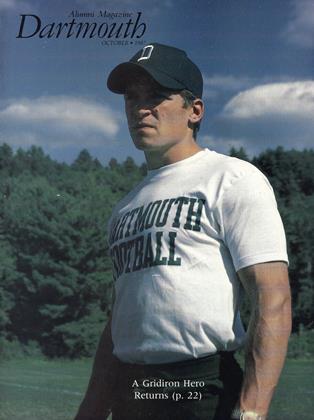The posters said it would start at 11 p.m.; by 10:45, 15 students stood or sat around the table at one corner of the room, waiting. Some chatted among themselves while others looked expectantly at the doorway.
By the appointed hour the group numbered more than 20 and buzzed like a capacity crowd during intermission. A student walked into the room and placed a stack of cups and several jugs on the table. "Save me some Oreos," he said, and withdrew, to a safe distance. Who, after all, would dream of coming between Dartmouth students and their milk and cookies?
If the present trend continues, milk and cookies may be here to stay. In June the Board of Trustees mandated that "no college-recognized organization or sponsor of a college-registered social event shall provide alcohol to any individual in a manner inconsistent with applicable laws."
Accordingly, effective June 29, the College prohibited the serving of alcohol to minors and banned kegs "from all individual rooms in residence halls, fraternities/sororities/coed houses."
It remains to be seen whether the drinking patterns that have emerged during the summer—with its fewer than 1,000 registered students, well over 90 percent of whom are underage—will continue through fall term and beyond. But for better or worse, campus life is changing. Steve Nelson, former director of Student Activities, noted increased attendance at nonalcoholic, campus-wide events such as weekly dances at the Collis Center and frequent outdoor band affairs. But some critics of the new policy suspect that students may start tanking up before they go out, or, at nonalcoholic fraternity parties, find a room upstairs in which hard liquor or sixpacks of beer are available.
Nonetheless, at least for the summer, the campus has gone partly off the sauce. Phil Meilman, College Coordinator for Alcohol and Drug Programs and a member of the Alcohol Policy Committee, reports that since the summer policy went into effect, "we're probably seeing over 50 percent fewer alcohol-related incidents this summer than last. The number of students admitted to both Dick's House and the Mary Hitchcock emergency room for alcohol-related medical problems is also down by about 50 percent, as a best-guess estimate." But, he adds, "the results aren't in; this term essentially finds us with only one class on campus the '89s which comprises a largely underage population."
Parties at which alcohol is served have not disappeared this summer, but there have been far fewer of them. And those that have been held have received more careful planning than in past terms as social chair- people work to fit parties within policy guidelines, according to Todd Cromheecke '89, summer president of Bones Gate fraternity. "Everyone's being more careful" about parties, says Cromheecke, "but no one really knows what they're doing because the policy is so new. People are trying to protect themselves, and protect other students."
Such caution has often meant pursuing other options: trips to Vermont, where many students are still of legal drinking age; fraternity or dormitory participation in the Survival Game (in which participants pack paint-loaded splatter guns); talks by professors; and, of course, milk and cookies. But wholesome snacks have by no means put Dartmouth wholly on the wagon. "People may be drinking less often," notes Paul Rich, "but when they do drink they're consuming as much as ever. And now, with the keg ban, you have three or four people privately killing a bottle of tequila."
Effective or not, a new alcohol policy is the College's only legal choice. By not pro- hibiting underage drinking, Dartmouth would leave itself open to untold liability lawsuits. Such liability is alleviated by the policy's intention to place responsibility with the individual student. Campus Police does not comb the campus for violations. Students who ignore the policy nonetheless do so at their own peril; by serving an underage or obviously inebriated person, one assumes substantial liability if the person falls down a flight of stairs or steps in front of a car.
To students of Dartmouth history, an alcohol policy limiting the use of kegs should come as no shock; the 1960s saw a ban on "serving beer in kegs in dormitories." Dartmouth's administrators lifted the ban in 1970 to encourage greater camaraderie and help provide alternatives to the rampant drug culture of the time, according to college Proctor Robert McEwen. Maybe they should have tried milk and cookies instead.
Timothy Burger, a senior from New York, is oneof this magazine's two Whitney Campbell Interns. He spent the summer term working forthe South-North News Service in Hanover.
 View Full Issue
View Full Issue
More From This Issue
-
 Feature
FeatureSETTING FREE THE MARKET
October 1987 By Tyler Bridges -
 Feature
FeatureBuilding a Better Student Body
October 1987 By Thurman Zick -
 Cover Story
Cover StoryThe Buddy System
October 1987 By Frank Cicero '85 -
 Feature
FeatureWhat Price Glory?
October 1987 By Ted Leland -
 Feature
FeatureAlumni Gym Scrapbook
October 1987 By Gil Williamson -
 Feature
FeatureBad Things You Learned in Gym
October 1987 By Lee Michaelides
Timothy J. Burger '88
-
 Cover Story
Cover StoryIf I Could Do It Over
December 1987 By Timothy J. Burger '88 -
 Article
ArticleA Sun-Powered Race Between Two Very Different Schools
December 1988 By Timothy J. Burger '88 -
 Article
ArticleThe Jungle's Front Man
APRIL 1990 By Timothy J. Burger '88 -
 Article
ArticlePolitics by Design
NOVEMBER 1990 By Timothy J. Burger '88 -
 Feature
FeatureBeyond Black And White
JUNE 1991 By Timothy J. Burger '88 -
 Cover Story
Cover StoryDartmouth's Congressman
April 1995 By Timothy J. Burger '88
Article
-
 Article
ArticleMr. Watson's article in this number of the MAGAZINE on "Americanism
April 1918 -
 Article
ArticleRavine Lodge Nears Completion
February 1939 -
 Article
ArticleAlumni Fund Green Derby Contests for 1942
January 1943 -
 Article
ArticleLouer Trust Gift
February 1947 -
 Article
ArticleDARTMOUTH SKI CRAZY
MARCH 1931 By Craig Thorn, Jr. -
 Article
ArticleTHE MEANING OF TOLERANCE
May 1948 By W. K. JORDAN

